Part 1 - Part 2

Meeting The Village At La Lutte
There had been a lot of discussion when we would have our dinner the evening we went to La Lutte, not least from the kitchen. The wrestling was due to start at 6.30pm. Gorgui picks us up at 5pm in a freshly painted horse-drawn cart (une charette) with his son, 18 month old Babou and we set off to meet his family. Their breezeblock house is on the road side of the village rather than the ocean side. When Kim goes into the one-room home his wife, Mamounia, is still getting dressed. I wait outside until it is safe for me to enter. In the sandy yard there is a fire, cooking pots, a kettle and an older woman probably an aunt or grandmother holding a baby. Gorgui's main 'family compound', where his parents live, is further into the village. We are given some mint tea and sit and talked for a bit. Well, Kim does all the talking in French on our behalf. We have some small gifts for them. A little keyring torch, some felt tip pens for the son and a postcard of London, which they seem to like. It is a very simple room with just a bed and bedside tables and a dressing table. Outside there is a cracked solar panel connected to a lorry battery for the inside lights
We make our farewells to Gorgui's wife and son then the three of us walk over to the arena or rather the village community space where the La Lutte is about to take place. The other guests from Les Collines pass us standing in the back of a 4x4 pickup, pah softies! At least we had arrived by horse and cart. There is a scrum of people around the entrance. We had given Gorgui 2,000 CFAs (about £3) for the entrance fee. He gets the tickets from a hole in the wall and we push our way with the crowd through the metal gates. La Lutte is a very big affair in the calendar for the local villages. Tonight is the first of the knockout contests and the wrestlers come from miles around. It lasts for three nights altogether and not only is it a matter of a great amount of village pride, the eventual winner collects a large cash prize - a slice of the accumulated entrance fees
There are a lot of people already inside the walls of the simple open air arena, sitting on benches or standing. The men and boys sit round three sides; the women, the judges, women singers and drummers are all on the other side. In the middle of the sandy pitch (about the size of a village hall) a large circle has been marked out with colourful rice sacks filled with sand
The combatants are striding and running around, warming and psyching themselves up. They are naked except for cloth tightly wound round their waists like Sumo wrestlers. Many of them sport different kinds of gris gris or magic charms. One man has a rope he sucks. Another has what looks like a wooden spoon. Another has a harness. Some have elaborate belts made of metal and shells. Their bodies are oiled. Some grab up a handful of sand and sprayed it over themselves, which gives them a piebald look. New contestants rush into the arena, making a lot of noise then vigorously push cow horns into the sand and pour various things like, sand, magic infused water or palm wine into the horn. They then chop the sand with the heel of their hands while muttering prayers to the gris gris. Some contestants have seconds who keep the bottles of sacred liquids or hold the belts during the fights.
We are hustled in on the men's side, past the smartly robed village elders and onto a wooden bench at the front displacing some young children - they have to sit in the sand. I look around and soak up the ambiance - there is a lot happening. The wrestlers are constantly moving around. There are three categories: lightweight, middle weight and heavy weight. We are opposite the singers, drummers and judges
The singers are a group of about ten women in beautiful traditional dress, sitting around on white plastic chairs. There is a main singer who calls the statement. The other women give an echo chorus while providing a constant percussive clapping. The response vocal comes from an old woman who sits in her own little circle of friends who are also clapping rhythmically. Over to their left are the drummers. There are about eight or ten of them. They really get into some deep grooves when they start to lock together. The women keep up a repetitive mesmeric vocal loop saying "be strong, be brave, fight hard" - an almost hypnotic encouragement for the contestants. The singers are amplified through old fashioned tannoy horn speakers which give the sound a wonderfully distorted quality with oodles of echo. The section of the arena for the women and girls fills up some with very smart outfits on view. The community arena where this is happening has one-storey high walls and an open veranda, painted white with faded paintings around the top. I can see men trying to get the lights on each wall to work
Meanwhile the wrestling has started. Lightweights first. There are three contests happening at once in the circle of rice sacks. Each has its own referee. The aim is to lift both feet of your opponent off the ground or tip him over. If you go outside of the circle the bout has to start again. The winner is declared by the referee holding up his arm. One loser is so disconsolate he lies down in the sand for a couple of minutes and won't be comforted. The bout starts with the contestants bending over head to head. One has his hands on the ground, the opponent grabs his wrists in order to stop him moving his hands and tripping him over
This is a slow, balletic contest. It's like a pair of rhino fighting - the pushing and pulling, the attack, the sheer will, determination and strength to resist and all the while trying to get your opponent off balance. Some of the bouts go on for ten minutes or more and you can see serious sweating. The wrestlers continually scoop up handfuls of sand over their shoulders and flanks to stop their grip slipping. There is a haze of sand and not a lot of movement and then a sudden flurry of activity. As the evening progresses the heavy weights start. The drummers are in a major groove dancing around and occasionally the women singers get up to dance in front of the drummers
The turnover of fights is quite quick. Meanwhile the lighting guys have been clambering around trying to get the lights to work. Only two seem to function so they go off, get a spade and dig two pits, put poles in and tamp down the sand. Then they run an extension cable over and put up some lights on the poles and a row of bulbs hanging off a line between the poles
We leave before the last bouts of the day in order to get back for dinner. Its dark now, there are only weak lights on the main streets and Gorgui leads us through the dark alleyways, as if it was broad daylight, nodding and talking to shadowy figures we never saw. He takes us to his parents' house where we meet his mother and the rest of the women, all in one room watching TV and making hair extensions. His wife has joined them. His mother is shelling peanuts. His father is in the next room shelling peanuts as well
Gorgui is going to take us home in the family horse and cart. It's used for farming their groundnut plot and has a pile of stems and leaves from groundnuts in the back. Gorgui talks to someone getting water from two large Ali Baba jars at the back of the house - there is of course no running water in the village. He reaches for a plank and the two men tie it to the sides of the cart for us to sit on. The torch we gave him, which immediately got clipped onto his belt, provides illumination as he leads the horse between the shafts and harnesses it. We clamber aboard and set off in the pitch black. I'm glad he knows where to go, I cannot see anything at all. We bounce along the road and down the track to Les Collines. It is very uncomfortable on the plank, the less well padded of us suffered. Indeed next day Kim said "what's that big bruise on your bottom?"
At last we hear the horse's hooves crunching over the shell path that leads to the lodge. It was a special evening. We clamber down and thank Gorgui and head off for dinner. There are a lot of stars tonight as we make our way across the sand and down to Lagoon Four
Next day our last breakfast and lunch at Collines are tinged in sadness. We could easily have spent two weeks here rather than just four nights! We like Collines very much. It has been created out of a love for the area and the local people. It is a good idea that has worked totally. The scale of it is right, small and friendly, well organised and the attention to detail is there. We hope we will come back one day
Reaching the Atlantic Ocean
In the afternoon we are driven over to The Royal Lodge, our final stop in Senegal. It is just beyond the far end of the village and feels very luxurious after the pure simplicity of Les Collines. Our room is made up of three large thatched circular areas (bedroom, bathroom and sitting area). It is light and white inside with two big beds and a minibar. We are a bit overwhelmed by the size of the bathroom which features endless hot water, a large circular shower, his and hers sinks and a massive Jacuzzi that you could fit at least four people into it. To our shame we do try it once. The amount of water it takes to fill it would have supplied a family in the village for a couple of months. The electricity needed to heat and pump that water could have provided electricity for six months - if that village family had mains electricity, of course
Our room is directly on the beach and has a large terrace. There are six or seven beachside rooms. Ours only has neighbours on one side; on the other is a huge and magnificent baobab tree. The beach slopes away gently to the crashing waves of the Atlantic Ocean that has come unimpeded all the way from the Caribbean. There is a wreck of an old freighter just past the lodge, from the days when this area was so remote there were no roads. Everything like sacks of rice and heavy goods had to come by boat from Dakar. The freighter had beached in 1971. Now it is split into two, the plating at the stern and sides all eaten away. The rust has eaten through everything. It looks as if one good storm would bring the masts down. But it obviously serves a useful purpose as an artificial reef given the number of fishing boats that plied their trade around it
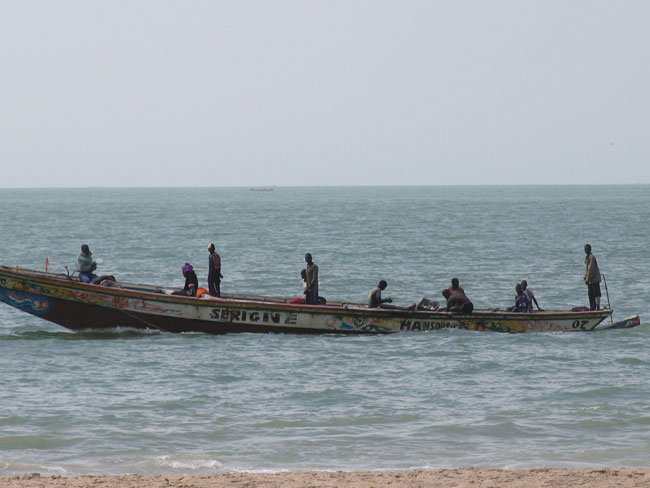
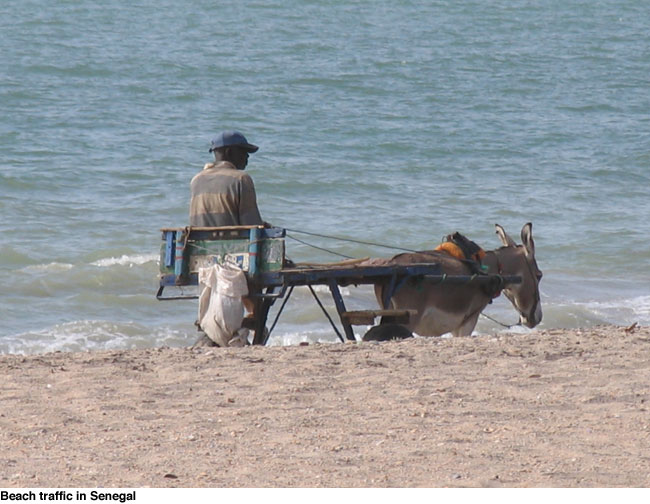
The beach is public property and a major highway for people walking between the villages. Horse and donkey carts pass up and down all the time. One day a load of off-road motorbikes and quads came blasting along. That looks real good fun. I'd love to do that!
There is a large infinity pool by the restaurant and bar area. As the sun sets it is reflected in the pool and if you look from low enough you can see the sky's mirror image in the pool. Very nice. But people did look at you funny as you knelt down with your head on the ground
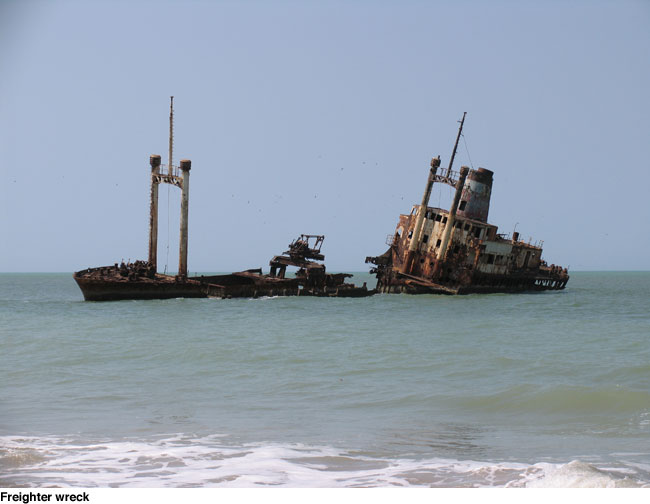
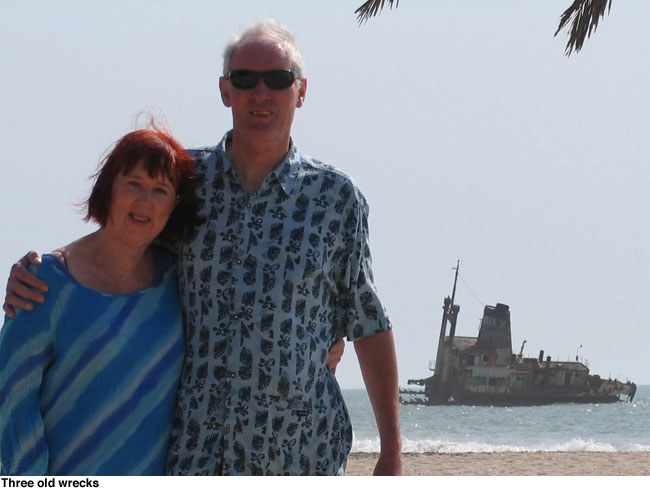
Although it is much more luxurious than our previous accommodation, the lodge is still pretty laid back. There are 28 rooms spread around the gardens and beach but the place isn't that full at all. The other guests are mainly French. The food is pretty fine. Not as good as Les Collines but still good. The fish is very good indeed, as you would expect. However the price of a Gazelle beer is double that at Les Collines.
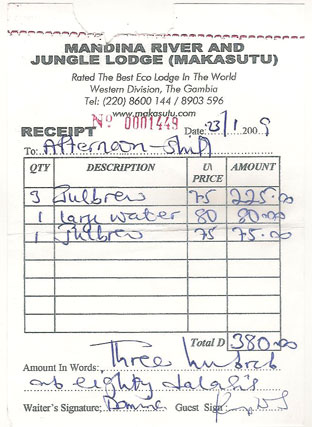
There is no entertainment thank goodness. But the background music in the bar area vacillates from ersatz Zouk Love, ersatz Rock and copies of American 60's soul. Though some times there is proper Senegalese music from Youssou N'dour and Ismael Lo. The staff are very kind and once they knew we had been to the village and La Lutte we really get talking.
One time I go for walk back towards the village, pass the security guard who sits under the baobab tree that marks the end of the lodge's territory. I don't think he is very busy. Walking the other way along the beach towards the wreck took you by the local tourist shopping opportunity. A little row of grass huts selling crafts. The boys catch you as you walk past and say "hello would you like to look at our goods etc". Beyond them on the beach are some collapsed buildings, evidently there were eleven little houses there once but the sea has washed them away. Kim and I walk right along to the next Palmarin village one day/
The beach has its own cycle of life: children walking to school and back, people on their way somewhere, the tourists, the security guards. In the morning a hotel employee with a donkey cart collects the rubbish washed up on the tide - depressing how much he collects on just a half mile of beach. It is also used as a gym by loads of the local guys. Some we thought were training for the wrestling. They would be running forward and backward, jumping, squatting, polishing the gris gris/
Time passed easily enough at Royal Lodge and on our last day we go and bought some objects from the beach boys. We chose a makeup type bag made from local fabric, some little shopping bags made out of old rice sacks, and a couple of little necklaces. We resist the carved wood objects that would never look the same in our city house.
For the drive back to The Gambia we have Essa again. He is happy to see us, as we are happy to see him. We set off on the four hour drive to the border. It seems a lot busier on the road than when we came, mainly because we had arrived in the afternoon, when the markets had closed down. We pass through some great markets in the little towns. Wish we could have explored them a little. But we have to get to the ferry
We make very good progress, only once impeded by a policeman who stopped us. He wanted to see the car's papers and Essa's ID card. He then asked us for a "cadeau", a gift. We said sorry we had nothing to offer him, we only had a few CFAs left and dashing the police was not the priority for them. Not unless he tried to arrest us. We stop at the border to be assailed again by the women and children selling cashews. This time, because I know the price, I get two bags for 50 Dalasis
We heave into view of the ferry and can see one about to dock. It looks like we were only in for a short wait. Essa parks the Cruiser outside a bank where there is a sign saying 'No Parking'. He hands the man guarding the parking a Dalasi note and the man moves the 'No Parking' sign. The people and vehicles pour off the ferry and we pour on. We go to the top deck and grab some seats. We buy cakes for ourselves and Essa off a young girl, - they are delicious. We are on one of the 'fast' boats that takes only 40 minutes to cross the river. But we have to wait for 20 minutes to dock as another ferry loaded up. There seem to be a lot of phone calls between Essa and boss man Yoro Baa who is waiting on the other side. And he seems to be in a very bad mood
Life Is Not A Beach
We speed down the road towards our one night stay at the Kombo Beach Hotel. We arrive as hoards of people are getting on coaches for the airport. We are a bit shocked at the volume of humanity and the size of their suitcases. I cannot understand what people take on a week's holiday to a hot place like The Gambia. We check in looking around with a bit of trepidation. The hotel looks a bit second-hand and tatty around the edges. I spot a plaque that said it had been opened in 1982 and it looked like it
We are shown to our room but, at 2 o'clock, it is not cleaned yet so we sit on our small balcony on our plastic chairs. Our room looks out over the central area with large thatched buildings on two sides, a pool in the middle, and around it, squashed into every available inch of space, are sun loungers with red lobsters on them. Kim says it is like some apocalyptic disaster movie where everybody has been evacuated to some central shelter area. The crashed out bodies appear to be in shock or lifeless. The only signs of life are waiters collecting bottles and glasses.
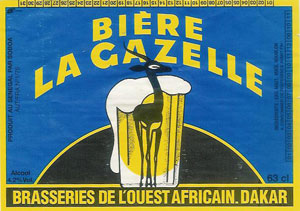
Its awfulness fascinates me and I kept having to have a peep out. We decide to have a walk around and get our bearings. We venture out onto the beach where again bodies lie cheek by jowl on loungers and all kinds of flesh is on view. Some people should not wear certain types of swimwear, like bikinis, and some certainly should not be topless. And that’s only the men!
We gingerly pick our way through and head for the sea, noting the lady with the lime green shirt and black skirt standing on the seaward edge of the rows of loungers. She is one of the new Beach Police that the government established because the bumsters - the hustlers who prowl the beaches - were annoying the tourists too much. We don't linger at the waterside. A lot of rubbish washed around the waterline and it doesn't look very nice at all. We walk on up the beach for a while
Back in the room we rest up and watch the world of the pool go by. This may not be Senegal but there is still a rhythm to the poolside life. As the sun starts to go down at about 6pm the pool area starts to empty. By 6.30pm it is deserted and the pool guys start moving all the loungers to the perimeter. I go in search of a beer at the main bar area. There is a big television with BBC Worldwide news showing silently. And the air is thick with tobacco smoke
There are a number of restaurant areas and we choose the small quiet one. It may be lacking in ambience but the food is good. After dinner we realise why the loungers had been moved back. It is entertainment round the pool time. Loud music started pumping out, varying from classic soft rock - The Searchers' "Pins and Needles" - to more thumpy stuff. The entertainment is described as a local dance troop. I expect local trad, but it is the kind of dancing you see on pop videos. The music did not disturb us. We fell asleep easily
The rest of the holiday had been wonderful but the Kombo Beach was a salutary and humbling experience for us. The next day, as always on day two, we were able to see beyond the surface. We realised there were quite a wide range of people there. Away from the beach we found a quiet leafy bird garden. The staff and the gardeners were working hard. But we were pleased to leave at midday to go the airport. We couldn't face the coach trip so we grabbed a taxi. The plane arrived a bit late and it was an almighty scrum to get on it. But it was a painless five and a half hours back to London
We were shocked when we got back to Victoria station at 1.30am and found the remnants of the snow that only a few days ago had brought London to a standsill… urgh
Part 1 - Part 2